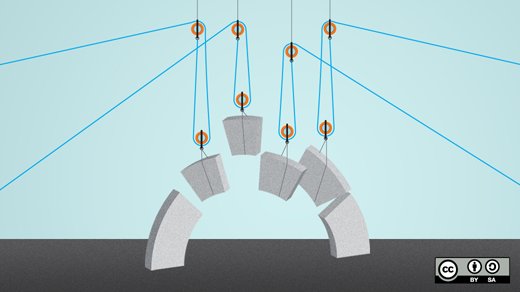An understanding of IT's past is important to moving forward with the cloud. When James Schweitzer, an IT specialist working in the IBM Watson Solutions Division, looks back on how the work of Ada Lovelace and Charles Babbage changed computing, he can't help but get excited about Watson's potential.
In this interview with Schweitzer, we discover how he got involved in open source and explore the evolving role of system administrators—particularly with the cloud. He tells us about a few open source projects that make his life easier and explains that automation is the foundation for self service.

opensource.com
How did you get involved with open source?
Working at a large bank doing general IT stuff on the trading floor. One day, management discovered a Linux cluster doing Monte Carlo simulations, and they needed someone dumb enough to get it out of the closet and "enterprise" it. The best part is, it turned out to be easier to maintain and support than any proprietary product. You don't hear it much anymore, but in the late '90s, the fear of being dependent on unsupported software downloaded from the internet was palpable. Open source just worked, and today that fear is largely gone.
What is your favorite part (and the most challenging opportunity) of working on the Watson project?
I like to look at questions like this in the context of history. I joined the team a bit after the commercialization of Watson began, turning it from a lab experiment to a viable product. It is a lot like watching the Altair turn into the Apple II: More fun than challenge. While there are numerous compelling use cases, I'm waiting for that VisiCalc moment to put cognitive computing in everybody's workspace and make it a necessity.
When you look back at Babbage and Ada Lovelace, they made a conceptual leap that the world wasn't ready to make for another century. Watson has the potential to make that leap because it doesn't have any preconceived notions on how to do things. More importantly, people might not dismiss Watson because it is abrasive and a dreamer, like Babbage, or a woman, like Ada.
What's an open source project used in cloud infrastructure that makes your life easier?
Cloud infrastructure wouldn't be possible without open source. I'm not even sure it would be financially viable without open source. Plus, a significant percentage of thought leadership in cloud comes out of open source projects and initiatives. I believe the key to cloud infrastructure will be configuration management. Doesn't really matter if it is Puppet, Chef, Salt, or Juju, but that automation is the foundation of the self service model.
How is the cloud changing the role of system admins?
IT is extremely good at disruptive change. In the '50s it would take hundreds of people to deploy and support a single computer that didn't time share, pure batch. Now, we support thousands of physical servers running multiples of virtual instances with multiple users. Desktop publishing and CD-ROM encyclopedias used to be viable businesses. Cloud has disrupted the sysadmin field, which has kept me employed since the '90s.
Why is it still important to learn Linux today?
You can't work in IT without at least some knowledge of Linux. It is a foundational knowledge that is just expected of new hires. Development, operations, networking, or storage—doesn't matter—Linux and the open source ecosystem are central to any infrastructure today. But it isn't just Linux. The entire ecosystem that has built up around Linux and all the applications that come in a distribution are what is expected now. You have to bring skills higher in the application stack.
What is one thing in society or technology that you wish were more open?
This is controversial, but data. When you walk by someone picking their nose, most people avert their eyes (ever notice that children will stare right at you?). They are giving you privacy, because instinctively we know everyone picks their nose, but we don't need to embarrass someone when we catch them doing it. By putting all the data in a tight lockbox and creating silos of information, we are preventing the beneficial uses of data, while government and criminals can still access it. As a society, we need to learn to avert our gaze again when people need privacy. Punish the people that abuse data, not the ones that use data.
James Schweitzer is speaking on his own behalf, not for IBM or Watson.





Comments are closed.